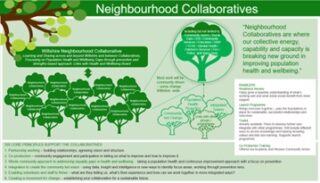Q Exchange
Improving culture, capabilities & structures for partnership & improvement in Neighbourhood Collaboratives
- Proposal
- 2024

Meet the team
Also:
- There are many people working part time on this project across multiple organisations - core ICB team include:-
- Luke Newman
- Claire Scudamore
- Aimee Jones
- Gina Sergeant
- Clare O'Farrell
What is the challenge your project is going to address and how does it connect to the theme of 'How can we improve across system boundaries?
Neighbourhood Collaboratives (roughly on PCN footprints which can zoom in and out to different areas and cohorts of people) are attempting to address the challenge of resolving health and wellbeing inequality gaps at community level – learning, adopting and spreading across the system at pace. Within that there are challenges around how we utilise the resources, capacity and capability of the system to work locally (alongside local people) in identifying and improving issues and needs that matter to our residents. Building strong, broad partnerships beyond statutory agencies, breaking down contractual and organisational barriers and moving to a prevention focused population health approach are cultural challenges, which are made harder by structural funding limitations that we’re seeking a new new model for.
What does your project aim to achieve?
Using existing resources in a new way our vision is to reduce health and wellbeing inequality gaps within neighbourhoods through transforming the way we work in partnership across the system in neighbourhoods. Taking a sustainable, prevention focused improvement led approach, each Collaborative will be underpinned by new data tools and methodologies and community and staff insights. We will share data, knowledge, resources, and experience to co-produce and design solutions to local community challenges on priorities and improvements important to local people. Specific examples include a reduction in serious falls and prevention of people becoming housebound.
The proposed project is to establish a Collaborative in the Salisbury area, testing how to build a collaborative in a community that has populations both urban, rural, deprived and wealthy with military alongside civilian, mixed ethnicities and religions.
This project can address all 4 of the Q Exchange areas for 24/25
How will the project be delivered?
A small project team coordinates the work and includes people from across partner organisations including the VCSE sector. A large scale partnership steering group guides development work and offers insight into planning and delivery. Smaller working groups sit under the steering group to delivery specific pieces of work – including a project (using £100k funding award) delivering a one-year programme to develop a best practice engagement model to use as the basis for engagement with communities, clinical cohorts or individuals. This will gather insights (from an agreed CORE20Plus5 group) and design and deliver intervention work arising from the engagement.
One of the programme principles is to use Quality Improvement methodology – the project team are Quality Service Improvement and Redesign qualified and hold other improvement, project and data qualifications.
The proposed role would sit within the project team to lead on the Salisbury test site.
How is your project going to share learning?
We have established the Wiltshire Collaborative which holds conference style events every 2 to 3 months – we already invite people beyond our boundaries and is an existing mechanism to share learning. These sessions are recorded and made available with open access.
In addition, we produce newsletters and we have developed a shared portal web platform that supports the Collaboratives community – this could move to open access.
Further – we are aiming to produce podcasts and other mixed media outputs as part of the toolkit we have already established.
Lastly, we would aim to share period updates and a final evaluation should we be successful in receiving a funding allocation.
How you can contribute
- Guidance / advice in evaluating a model and measuring added value to prioritises prevention and partnership as a driving of unplanned care reduction - includes measuring increased productivity and reduced waste.
- Advice from people with experience of building varied and sustainable partnerships - particularly in holding the group together and enabling people and organisations to move closer or away as the work develops / becomes more or less relevant to their organisations.
- Support in building a change movement - this is a cultural change in an environment of significant funding and operational pressure.
- Support to harness / develop further the structures we've built to influence / improve the culture, capabilities and structures needed for learning and improvement across unconventional system partnerships.
- Expertise in creative / novel funding models to reduce waste / duplication and enable transformation and change across structural system boundaries.
- Advice in managing complex large scale transformation particularly in an area of challenging relationships and contexts.
Plan timeline
| 29 Mar 2024 | Intervention Phase Completed (under way) |
|---|---|
| 29 Mar 2024 | Launch Programme Scheduled (during June) - identification of developments to test |
| 29 Mar 2024 | Readiness Review with Salisbury area Partners completed |
| 26 Apr 2024 | Evaluation Phase completed - learning and insights shared at each stage |
| 26 Apr 2024 | Potential Target Cohort(s) Group areas agreed following analysis and discussion |
| 30 Apr 2024 | Salisbury Collaborative Coordinator Appointed |
| 24 May 2024 | First tier data analysis completed to inform launch programme |
| 14 Jun 2024 | Salisbury Collaborative group, vision and plan (first stage projects) confirmed |
| 1 Jul 2024 | Launch programme (3 sessions) completed |
| 27 Sep 2024 | Engagement Stage completed (initial cohorts) |
| 27 Sep 2024 | Full data analysis completed |
| 29 Nov 2024 | Intervention Coproduction Development Phase Completed including measurement plan |
Comments
Emily Beardshall 19 Mar 2024
Sounds great and would love to hear more about the plans. Happy also to share some of learning from evaluating similar initiatives in the Gloucester area.
Comments are now closed for this post.